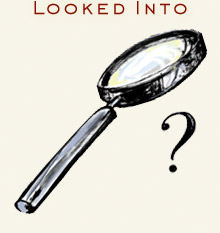Emdashes—Modern Times Between the Lines
The Basics:
About Emdashes | Email us
Ask the Librarians
Best of Emdashes: Hit Parade
A Web Comic: The Wavy Rule
Features & Columns:
Headline Shooter
On the Spot
Looked Into
Sempé Fi: Cover Art
You Say "Potato," and I Say "Victuals"
Filed under: Looked Into Tagged: Benjamin Chambers, Jared Diamond, Katharine White, Mary Gaitskill, newyorker.com, Vladimir Nabokov

Benjamin Chambers writes:
Fans of The New Yorker (TNY) fiction podcast may not have noticed, but when author Mary Gaitskill recorded her otherwise-excellent reading of Vladimir Nabokov’s story, “Signs and Symbols” (or, as TNY’s first fiction editor, Katharine White, preferred for no very obvious reason, “Symbols and Signs”), Gaitskill mispronounced the word “victuals” by reading it as it’s spelled, rather than the correct way: vittles. I didn’t notice it myself, because I’ve always pronounced “victuals” the way Gaitskill does, thinking that “vittles” was just a hillbilly synonym, but otherwise unrelated. (Thanks to Languagehat for setting me straight. When TNY asks me to read for their fiction podcast, I won’t make that gaffe!)
In a similar fashion, another corner of the blogosphere has been busy weighing the merits of Jared Diamond’s piece in the April 21st issue on the comparative value of exacting vengeance vs. the contemporary western justice system. The main post, by Rex (Alex Golub), is excellent, the following (lightly copyedited) segment in particular:
Fans of The New Yorker (TNY) fiction podcast may not have noticed, but when author Mary Gaitskill recorded her otherwise-excellent reading of Vladimir Nabokov’s story, “Signs and Symbols” (or, as TNY’s first fiction editor, Katharine White, preferred for no very obvious reason, “Symbols and Signs”), Gaitskill mispronounced the word “victuals” by reading it as it’s spelled, rather than the correct way: vittles. I didn’t notice it myself, because I’ve always pronounced “victuals” the way Gaitskill does, thinking that “vittles” was just a hillbilly synonym, but otherwise unrelated. (Thanks to Languagehat for setting me straight. When TNY asks me to read for their fiction podcast, I won’t make that gaffe!)
In a similar fashion, another corner of the blogosphere has been busy weighing the merits of Jared Diamond’s piece in the April 21st issue on the comparative value of exacting vengeance vs. the contemporary western justice system. The main post, by Rex (Alex Golub), is excellent, the following (lightly copyedited) segment in particular:
… Diamond fails to think anthropologically even if the people he discusses are stereotypically anthropological subjects. Anthropologists insist that culture is a force which has its own unique power to shape people’s lives and cannot be reduced to an effect of an underlying, deeper cause. So when Diamond remarks that pigs are valuable to highlanders because they (the highlanders) are “protein starved,” an anthropologist is not satisfied. This has probably been true of different places in different times in the highlands … and nutritional needs obviously affect human behavior, but so does culture.Nicely put. Wade through the comments, too, if only to watch anthropology wonks in a dust-up. (Hope nobody ended up with a vendetta on their hands!)
Pigs are always valuable in culturally specific ways. When highlanders in PNG [Papua New Guinea] give pigs, do they exchange live pigs or pork? Who gets the piglets from the live pigs, and who gets the pork when it is eaten? These questions are deeply tied up in issues of nutrition, but they are also culturally structured. Equally, Diamond writes that in Nipa, fighters exhibit “unchecked” aggression, [but] then goes on to describe in detail the culturally specific ways in which they fight: rules regarding engagement (or non-engagement if you have relatives on the other side of the fight) and so forth. So in fact, while the human desire may be universal (and that’s a big ‘may’), so is the fact that it is always shaped and channeled in culturally specific forms. The more you know about people’s lives, the less easy it is to explain them wholly in terms of protein, geography, genetics and what have you.



